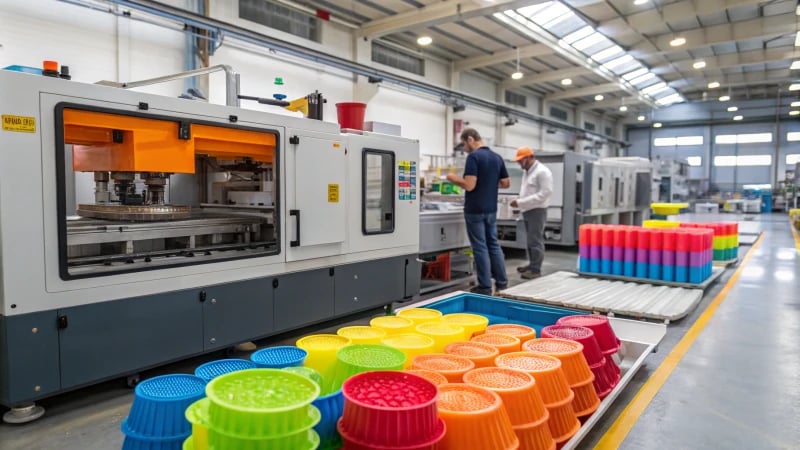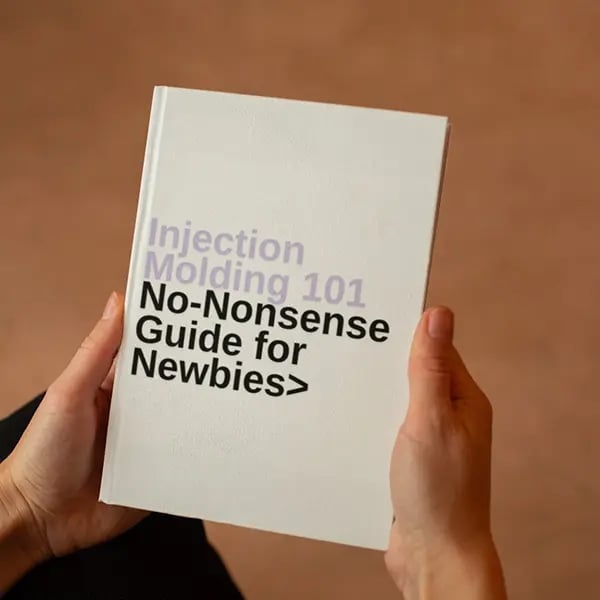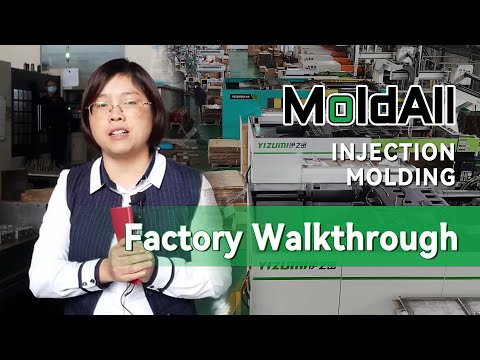
Have you ever thought about how plastic gadgets come into existence? Discover the interesting process behind plastic molding. This is the method that gives shape to the items we use every day. It’s truly fascinating!
Plastic molding is a crucial manufacturing process that shapes plastic into complex forms, essential for industries like consumer electronics and packaging.
As I learned more about plastic molding, I felt amazed by the detailed methods involved. Techniques like injection molding or extrusion each have unique qualities. For instance, when I first saw injection molding, I was captivated. Molten plastic turned into complex shapes like toys and phone cases in only moments. It’s not just about crafting objects. It’s about shaping our everyday experiences. Understanding these processes really deepens our appreciation for the products we often overlook.
Plastic molding is essential for producing complex shapes.True
Plastic molding enables efficient manufacturing of intricate designs, crucial for various industries.
Everyday plastic products are made using metal molding techniques.False
Plastic products are primarily created through plastic molding, not metal methods.
What are the Key Advantages of Plastic Molding?
Plastic molding plays a vital role in modern manufacturing. It provides many benefits. It improves production speed. It also raises product quality. What are the main advantages of plastic molding?
Plastic molding, particularly injection molding, is cost-effective, versatile, efficient, supports various materials, and minimizes waste, making it crucial for manufacturing and aiding business success across diverse needs.
Cost-Effectiveness
Plastic molding is really cost-effective. I remember working on a project making thousands of parts for a new electronic device. The mold seemed expensive at first. But when we started mass production, costs fell quickly with each item produced. This dramatic drop is typical in injection molding. Once you set up the mold, the cost for each unit becomes very low as you produce more. It’s a great relief for designers like me, who need to balance good quality and a tight budget.
Versatility
Plastic molding has amazing versatility. I once had to design a set of parts that required perfect fitting but were of different shapes and sizes. Plastic molding allowed me to create both complex designs and larger parts without losing quality. This flexibility lets designers meet various market needs easily.
High Efficiency
Efficiency is really important for keeping projects on schedule. During a fast project, I saw our injection molding machine work quickly, letting us meet tight deadlines without losing quality. The machine produced complicated shapes at an amazing speed. Fast production leads to quicker product launches. It gives us an exciting competitive advantage.
Material Variety
Material selection in plastic molding is very valuable. I felt thrilled to discover the many types of plastics available for our projects. Each plastic has unique properties for specific uses:
- ABS provides toughness and resists impact.
- Polycarbonate offers transparency and resists heat.
- PVC ensures durability and resists chemicals.
This variety allows us to pick materials that improve product performance while meeting industry standards.
Minimal Waste
Reducing waste is important today. Techniques like injection molding allow recycling and reusing excess material in future production. Being part of a process that saves costs and is eco-friendly makes me proud to be in this industry.
Conclusion
Thinking about these advantages reminds me of my colleague Jacky, a skilled product designer who often uses plastic molding in his work. Knowing these benefits helps professionals like him choose techniques wisely. This process can raise productivity and cost efficiency in manufacturing. It’s amazing to imagine the future possibilities plastic molding offers for design innovation.

When I explore the world of plastic molding, I really feel amazed by its incredible powers. This process plays a very important role in many industries. Plastic molding does not just create items; it creates new opportunities. Let’s look at the main benefits together.
Plastic molding offers a range of advantages that make it a preferred choice in various industries. Below are some key benefits:
Cost-Effectiveness
One of the primary advantages of plastic molding, particularly injection molding, is its cost-effectiveness. Once the initial investment in the mold is made, the production costs per unit decrease significantly with higher volumes. This process allows for mass production of parts, which reduces the per-item manufacturing cost.
For instance, businesses can achieve a lower cost per item when producing thousands of units compared to smaller batch productions. This is vital for companies looking to optimize their production budget.
Versatility
Plastic molding techniques can create a vast array of shapes and sizes, making them versatile for different applications. Whether it’s intricate designs or large components, the ability to mold plastic into desired forms is unparalleled.
Consider the following common plastic molding methods and their applications:
| Molding Method | Applications |
|---|---|
| Injection Molding | Toys, phone cases, automotive parts |
| Extrusion Molding | Pipes, sheets, films |
| Blow Molding | Bottles, containers |
| Compression Molding | Electrical housings, large components |
| Blister Molding | Packaging for food and electronics |
This versatility allows designers and manufacturers to cater to diverse market needs effectively.
High Efficiency
Plastic molding processes, especially injection molding, are known for their high efficiency. These methods can produce complex shapes with high precision in a short amount of time. Once set up, an injection molding machine can cycle through multiple production runs quickly, increasing throughput significantly.
This efficiency translates to faster time-to-market for products, giving companies a competitive edge. Moreover, with automation and advancements in technology, these processes continue to improve, leading to even better efficiency in production.
Material Variety
Another significant advantage is the variety of materials available for plastic molding. Manufacturers can choose from numerous plastics, each offering distinct properties tailored to specific applications. For example:
- ABS for toughness and impact resistance,
- Polycarbonate for transparency and heat resistance,
- PVC for durability and chemical resistance.
This selection helps companies to optimize product performance based on their specific requirements while ensuring the products meet industry standards.
Minimal Waste
Plastic molding techniques are designed to minimize waste during production. Particularly with methods like injection molding, excess material can often be recycled and reused in future runs. This not only makes the process more sustainable but also reduces costs associated with raw materials.
Conclusion
Understanding these advantages helps professionals like Jacky, who is experienced in product design, to make informed decisions regarding the implementation of plastic molding techniques in their projects. The benefits outlined above highlight how this process can enhance productivity and cost efficiency in manufacturing.
Plastic molding is cost-effective for mass production.True
Once the mold is created, producing large quantities reduces per-unit costs significantly, making it economical for businesses.
Plastic molding methods can create complex shapes efficiently.True
Techniques like injection molding allow for high precision and quick production cycles, enhancing efficiency and reducing time-to-market.
How Does Injection Molding Compare to Other Methods?
Do you feel confused about which manufacturing process to pick for your project? I once faced the same puzzle. I discovered injection molding during my search. This method really stands out among others.
Injection molding is favored for its efficiency, precision, and ability to produce complex shapes, making it ideal for mass production. It offers distinct advantages over methods like extrusion and blow molding.

Overview of Injection Molding
Injection molding impresses me as I explore different production methods. It stands out for its precision and creativity. The first time I saw a complex toy created through this process, I was amazed. The details were very intricate, showing the power of injection molding in transforming ideas into real objects.
Comparison with Other Molding Methods
When I compared injection molding to other techniques, many factors stood out: efficiency, cost and the best applications for each. Let’s review the main options:
| Method | Efficiency | Cost | Common Applications |
|---|---|---|---|
| Injection Molding | High; suitable for large volumes | Moderate initial setup costs | Toys, automotive parts, electronic casings |
| Extrusion Molding | Continuous production | Lower per-unit cost | Pipes, films, profiles |
| Blow Molding | Efficient for hollow products | Moderate setup cost; lower unit cost at scale | Bottles, containers |
| Compression Molding | Slower than injection | Lower initial investment | Large, thick-walled items like automotive parts |
| Blister Molding | Fast for thin products | Low cost for high volume | Packaging for food and electronics |
Advantages of Injection Molding
- Precision and Complexity: I admire injection molding for creating detailed designs with great accuracy. Designers can produce items that look very impressive while functioning well. Check the design intricacies1 for more details on its capabilities.
- High Production Rates: Once the mold is ready, production is very fast! During high demand periods, injection molding allowed us to maintain quality and speed. It’s very useful for large-scale manufacturing.
Disadvantages of Injection Molding
- High Initial Costs: There are drawbacks too. Creating molds isn’t cheap. In cases where production runs were small, the investment didn’t feel worth it. It left me desiring more flexibility. For more on costs, see cost analysis2.
- Material Limitations: Injection molding is versatile, but not all materials are suitable. Some need special processes or equipment, which adds complexity.
Suitability for Applications
Choosing the right method depends on your product’s needs. For example:
- Injection molding is ideal for parts requiring high precision.
- Blow molding suits hollow items like bottles.
- Compression molding is best for larger items without intricate details.
For more on which method fits each application, visit application suitability3.
Understanding the right method is crucial in the industry. Every project is different. The correct choice really affects the balance between efficiency and quality.
Injection molding is ideal for mass production of complex shapes.True
This claim highlights injection molding's efficiency in producing intricate designs at scale, making it suitable for high-demand products.
Blow molding is more efficient than injection molding for solid items.False
This statement is false as blow molding excels in creating hollow products, not solid ones, where injection molding is superior.
What Are the Common Applications of Plastic Molding in Industry?
Do you ever think about the everyday items around you? The sleek dashboard in your car looks nice because of plastic molding. The durable cover of your smartphone stays strong because of it as well. Plastic molding shapes the world. It really plays an important role. Let’s explore its fascinating uses together!
Plastic molding is crucial in various industries, creating lightweight parts in aerospace, dashboards in automotive, casings in electronics, bottles in packaging, syringes in medical, and pipes in construction, highlighting its vital role in modern manufacturing.

Plastic molding is an essential process used across various industries due to its versatility and efficiency. Here’s a comprehensive look at its common applications:
Aerospace Industry
Plastic molding plays a significant role in the aerospace industry, where lightweight and durable components are crucial. Parts such as interior panels, housings for electronic equipment, and structural components are manufactured using injection molding. The ability to produce complex shapes with precision makes it ideal for this sector. For example, the production of lightweight cabin components4 helps improve fuel efficiency in aircraft.
Automotive Industry
In the automotive industry, plastic molding is widely used for producing parts like dashboards, bumpers, and interior trims. Injection molding allows for high-volume production of intricate designs that enhance both aesthetics and functionality. Additionally, extrusion molding is used to create plastic tubing and profiles5 that are critical for various systems in vehicles.
| Application | Molding Method | Products Examples |
|---|---|---|
| Interior Panels | Injection Molding | Door panels, dashboards |
| Bumpers | Injection Molding | Front and rear bumpers |
| Plastic Tubing | Extrusion Molding | Fuel lines, air conditioning |
Consumer Electronics
Plastic molding is pivotal in the production of consumer electronics, where aesthetics and functionality are equally important. Products like mobile phone casings, television housings, and gaming consoles often utilize injection molding due to its ability to deliver high precision and smooth finishes. For instance, the use of blow molding6 in creating durable plastic bottles for electronic devices ensures protection against damage.
Packaging Industry
The packaging industry significantly benefits from plastic molding techniques. Blow molding is commonly employed to create hollow containers such as bottles and jars, while blister molding is ideal for packaging electronics and food items. This industry relies on these processes for producing lightweight and cost-effective packaging solutions7 that cater to consumer needs.
Medical Devices
In the medical field, plastic molding is utilized to manufacture components that require high levels of hygiene and precision. Items such as syringes, surgical instruments, and medical device housings are often produced via injection molding. The consistency in production quality is critical as it affects both safety and efficacy. An example of this is the production of single-use medical supplies8 that reduce contamination risks.
Construction Industry
The construction industry also utilizes plastic molding for various applications including pipes, fittings, and insulation materials. Extrusion molding is frequently employed to produce PVC pipes used in plumbing systems. These products must meet specific standards for durability and performance. For example, the use of plastic siding9 in buildings provides both aesthetic appeal and weather resistance.
Plastic molding is essential for lightweight aerospace components.True
Plastic molding produces lightweight parts for aerospace, enhancing fuel efficiency and performance. This is crucial for modern aircraft design and manufacturing.
Injection molding is the only method used in automotive production.False
While injection molding is widely used in automotive parts, other methods like extrusion also play a significant role in producing various components.
What Should Designers Consider When Choosing a Molding Process?
Exploring the world of plastic molding sometimes feels overwhelming. However, it does not have to feel this way! I think about my own experiences and share important insights here. These insights probably help in making better decisions. Better decisions can lead to fantastic products.
Designers should consider material properties, design complexity, production volume, tolerances, mold costs, and environmental impact when selecting a molding process for plastic products.

When choosing a molding process, designers must consider several critical factors to ensure the success of their projects.
Material Properties
Understanding the properties of the plastic material you intend to use is fundamental. In my early design days, I picked a material without fully understanding it. That was a humbling lesson. Different molding processes work best with specific types of materials. For instance, injection molding is ideal for thermoplastics, while compression molding is suitable for thermosetting plastics. By analyzing the material characteristics10, you can select the right molding method that complements your design goals.
Design Complexity
The complexity of your design plays a significant role in the molding process selection. Creating detailed shapes is thrilling but challenging. I worked on complex electronics and found injection molding was best for precise features. On the other hand, simpler designs may be more efficiently produced using methods like extrusion or compression molding.
Production Volume
Production volume is another crucial aspect to consider. If you’re looking to produce large quantities of a product, injection molding is often the most efficient method due to its high-speed production capabilities. I worked on projects needing thousands of units fast; injection molding saved us time. For lower volume production, techniques like blow molding11 or blister molding may be more cost-effective and faster to set up.
Tolerances and Shrinkage
Every molding process has its own shrinkage rates and tolerance capabilities. Designers need to account for these factors when creating their models. I had issues by not considering shrinkage rates, causing parts not to fit. Understanding how to manage these factors can help avoid issues like defective products12 during production.
Mold Design and Cost
The design of the mold itself can influence your choice of the molding process. Complex molds require more time and investment but can lead to better-quality products. Consideration of mold cost is also essential; for instance, an injection mold is typically more expensive than an extrusion die, but it can also yield higher production rates.
| Factor | Injection Molding | Extrusion Molding | Blow Molding | Compression Molding | Blister Molding |
|---|---|---|---|---|---|
| Complexity | High | Low | Medium | Low | Medium |
| Production Volume | High | Medium | Medium | Low | Low |
| Mold Cost | High | Low | Medium | Medium | Low |
| Material Types | Thermoplastics | Thermoplastics | Thermoplastics | Thermosetting plastics | Thermoplastics |
Environmental Considerations
Finally, designers should not overlook the environmental impact of their chosen molding process. I learned how our choices affect the planet; processes like extrusion13 can generate waste and have higher energy consumption compared to others. Therefore, selecting a more sustainable option can not only benefit the environment but also enhance your brand’s reputation.
By carefully evaluating these factors—material properties, design complexity, production volume, tolerances and shrinkage, mold design and cost, as well as environmental considerations—designers can make informed decisions when selecting the most suitable molding process for their projects.
Injection molding is ideal for thermoplastics.True
Injection molding works best with thermoplastics, allowing for intricate shapes and high production efficiency.
Environmental impact is irrelevant in molding process selection.False
Ignoring environmental impact can harm brand reputation and sustainability efforts, making it a crucial consideration.
Conclusion
Plastic molding is essential for shaping plastic products through methods like injection and extrusion, offering benefits such as cost-effectiveness, versatility, and minimal waste.
-
Discover detailed comparisons of injection molding versus other methods to optimize your production strategy. ↩
-
Learn about the pros and cons of different molding methods to make informed decisions. ↩
-
Find insights on which molding method suits your product best based on requirements. ↩
-
This link provides an in-depth overview of plastic molding applications across multiple sectors, enhancing your understanding of its industrial significance. ↩
-
Discover how plastic molding shapes the automotive industry by exploring specific examples and methods used in manufacturing car parts. ↩
-
Learn about innovative uses of plastic molding in consumer electronics and how it affects product design and functionality. ↩
-
Explore the significance of plastic molding in the packaging industry and its impact on product safety and marketability. ↩
-
Understand the role of plastic molding in medical device production and how it ensures safety and precision in healthcare applications. ↩
-
Investigate how plastic molding contributes to construction materials and their performance standards in modern architecture. ↩
-
Discover key factors affecting your choice of plastic molding processes, enhancing product quality and manufacturability. ↩
-
Get insights on mold design costs and strategies to optimize expenses. ↩
-
Understand how to manage tolerances and shrinkage in plastic molding to ensure product success. ↩
-
Explore eco-friendly practices in plastic manufacturing for sustainable design solutions. ↩






